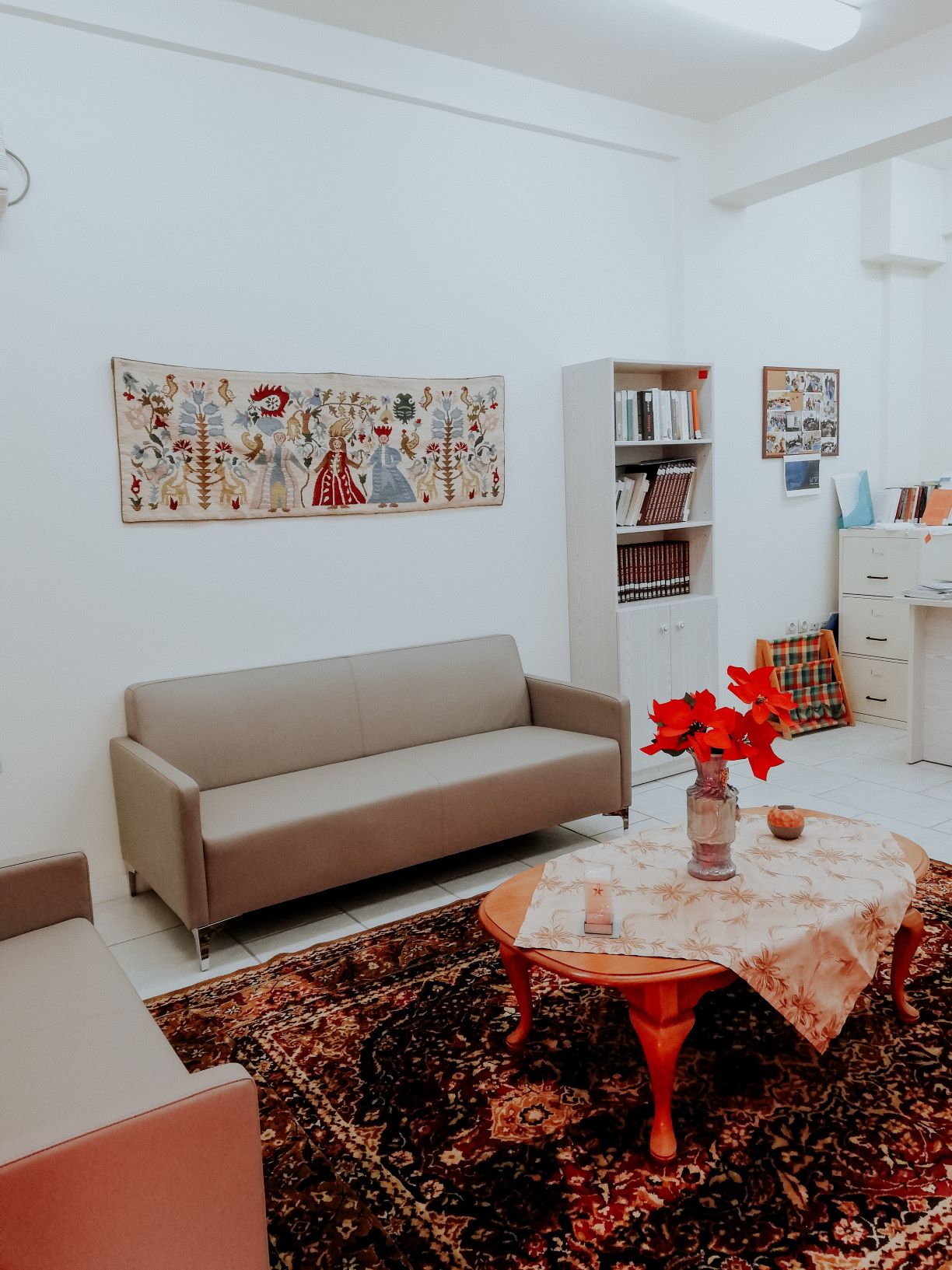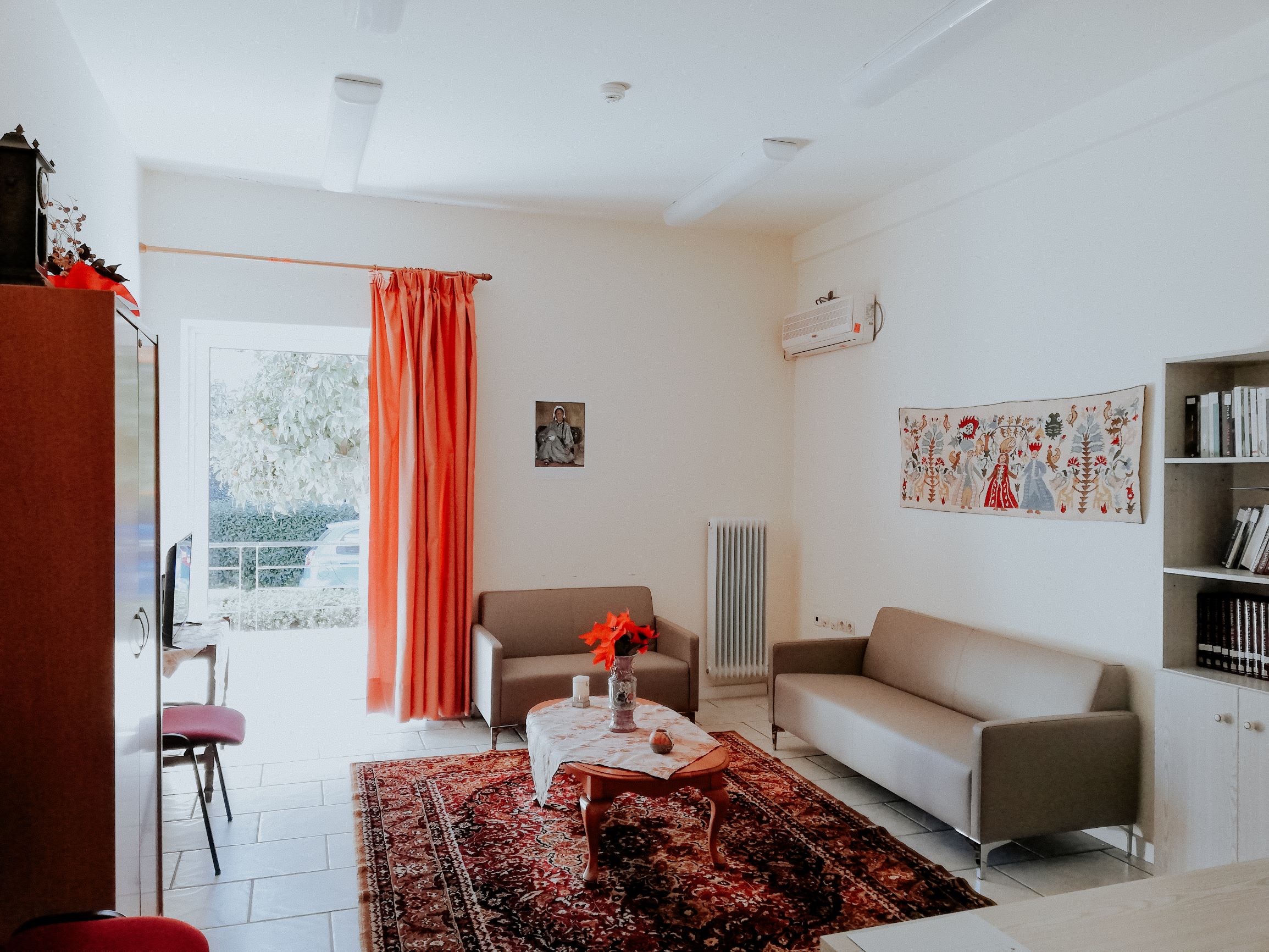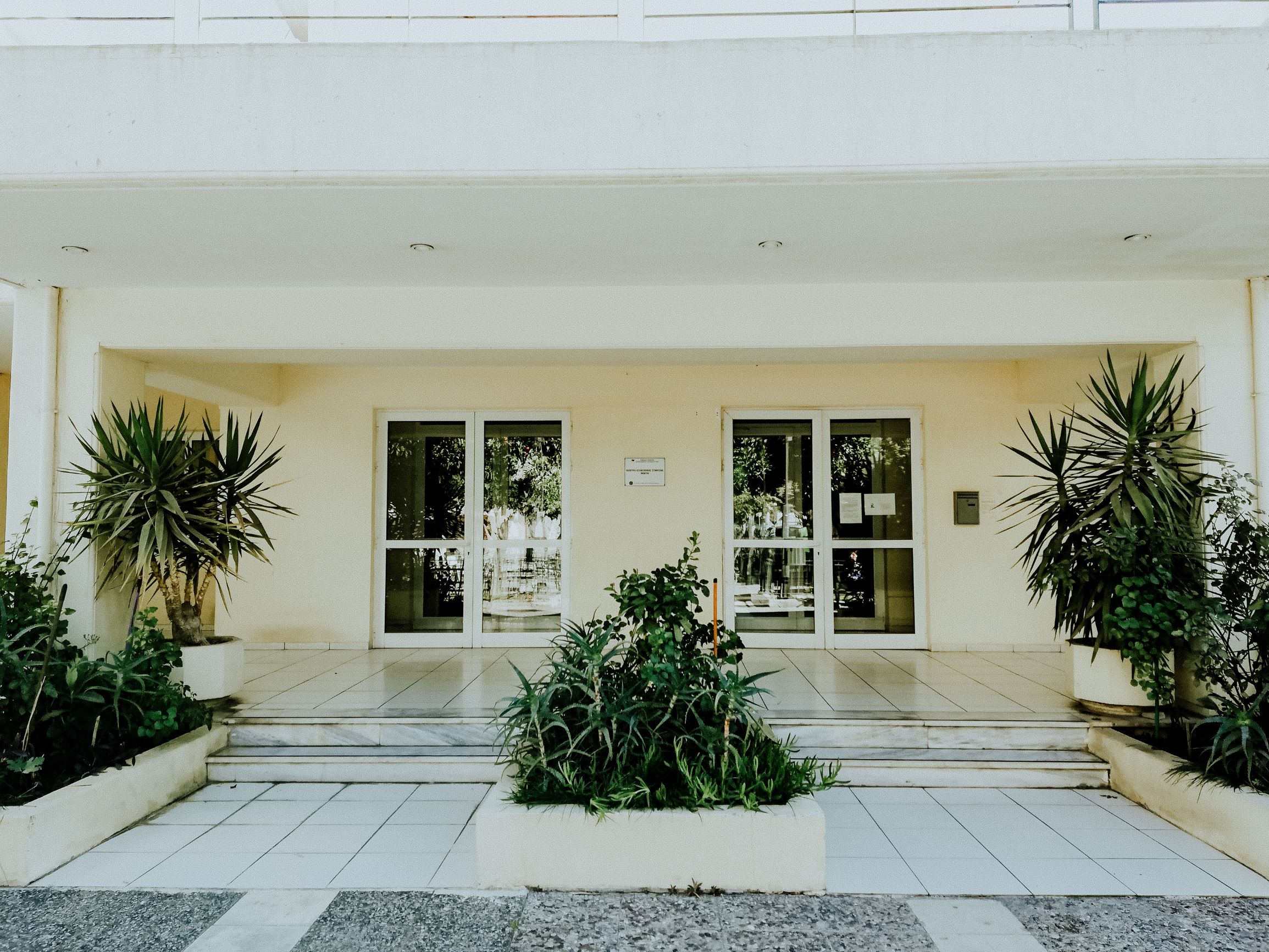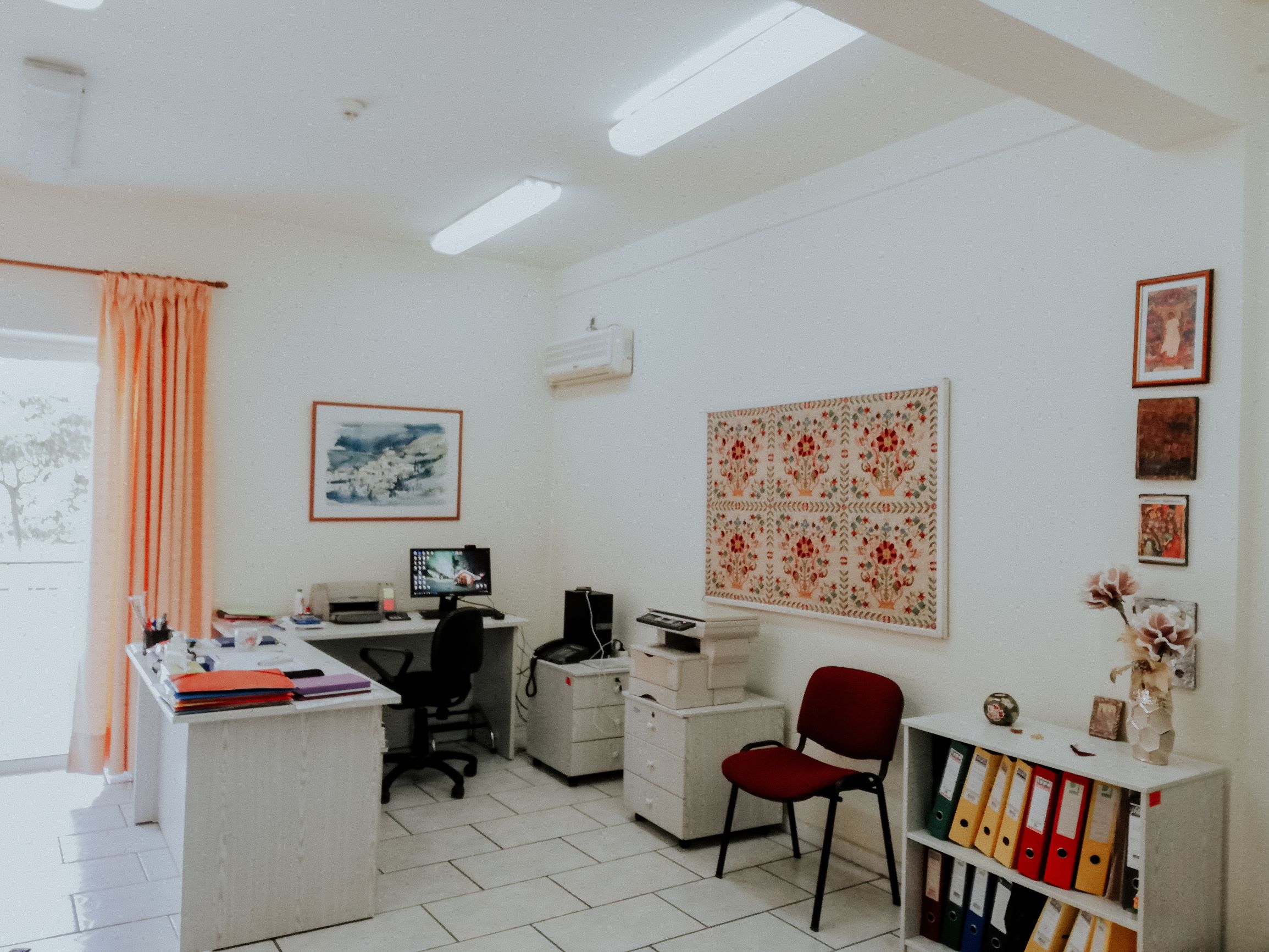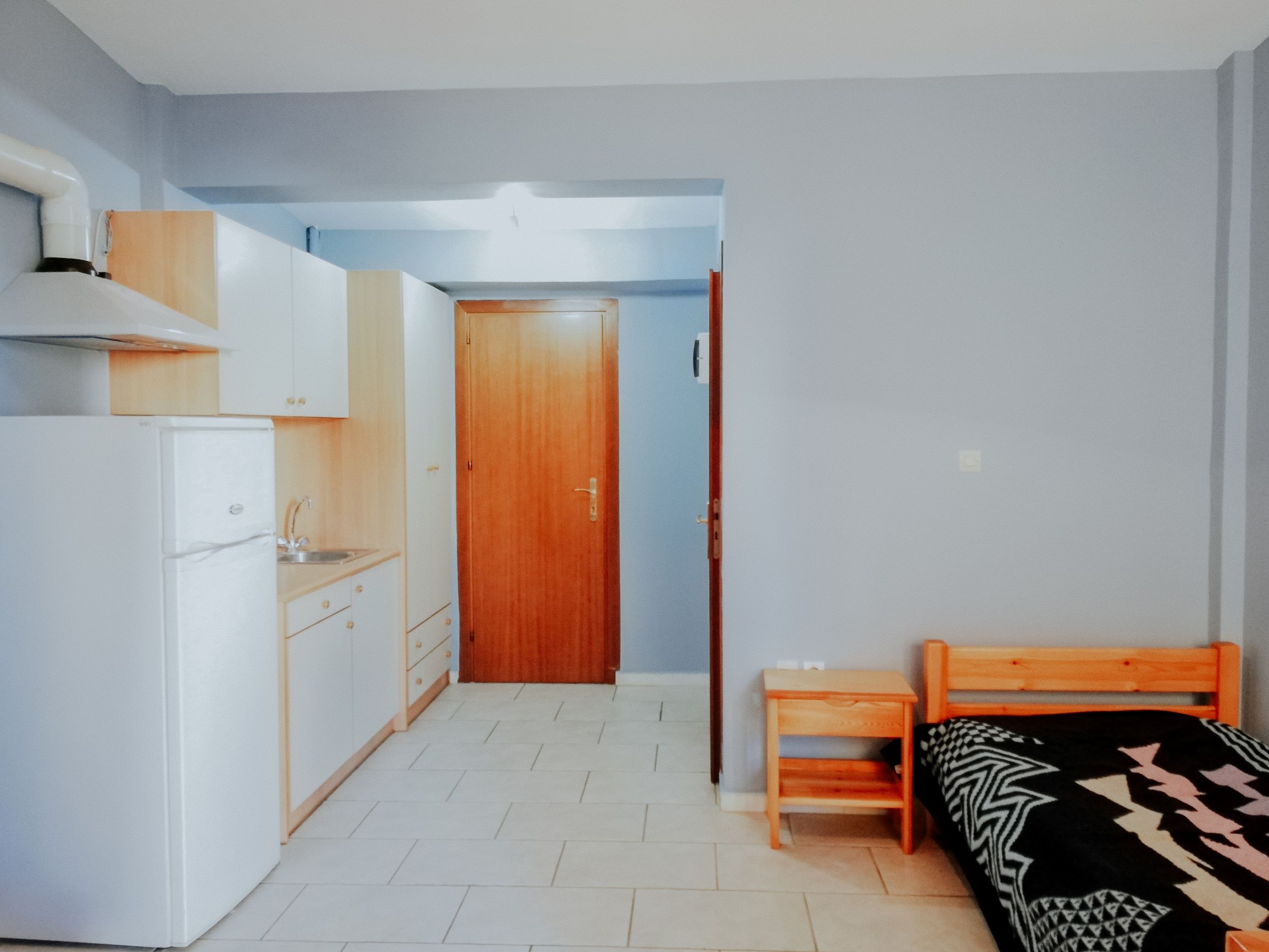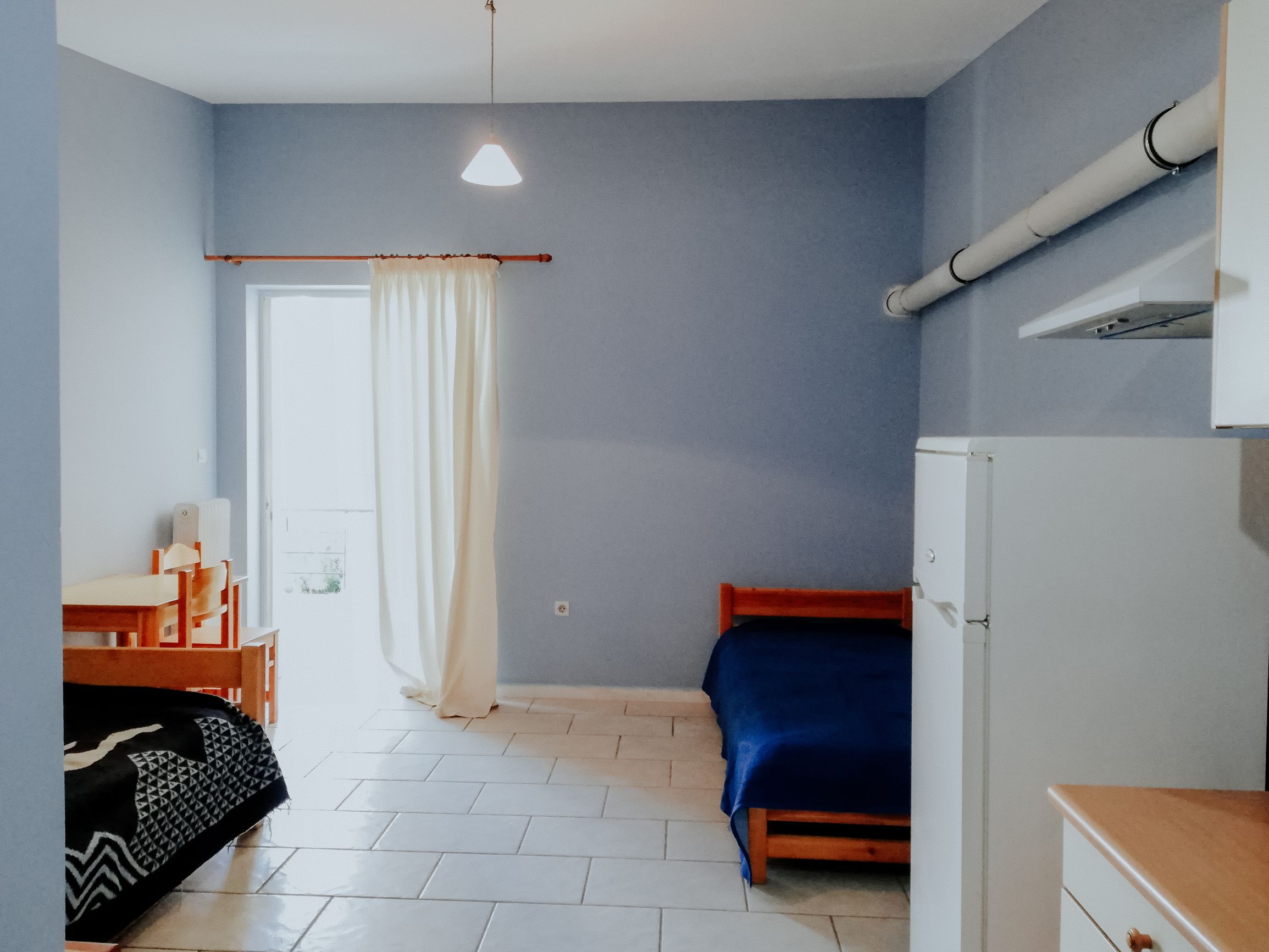EKKA is member of the Project’s Administration Team for Monitoring the implementation of the Council of Europe Convention on preventing and combating violence against women and domestic violence, better known as the Istanbul Convention.
PSYCHOSOCIAL SUPPORT IN THE SHORT-TERM SHELTER
In the Short-term Shelter for Women Victims of Violence and Multiple Discriminations, there is a Social Service that provides psychosocial support services to women and their children by experienced and trained - through continuous trainings and certified seminars - professional social workers and psychologists.
Through the use of the methodology, the scientific approach and the tools of each discipline (social history, individual and group sessions, follow-up after the closure of the case) and giving the needed specialized and individual services in the framework of empowerment, job counselling and psychosocial support of women and their children.
The aim of the Social Service is the self-improvement and personal development of the women, their reintegration in the social web and the job market, through the best version of their role and position.
The aim of the development of a cooperative relationship and trust helps the mobilization of the women.
More specifically, the services that are provided are:
- Counselling focused on:
- Accepting help to realize and prioritize her needs and problems
- Encouragement to achieve
- Self-respect
- Self-esteem and
- The psycho-social-financial independence,
- Connection to Community Services, Public and greater Public Sector Agencies, as well as Non-Governmental and Volunteer Organizations, International Organizations and Associations that work on these problems and respond to the women’s and their children’s needs.
- Inclusion of children in the Primary and Secondary Education
- Mediation and Referral aiming at:
- Legal counselling, information and free legal representation
- attending professional training and reintegration programs and
- attending job counselling sessions
- Cooperation with Services providing interpretation, so that the communication takes place in the women’s native language and gather information regarding the habits and the customs of their country of origin.
- Compiling an individualised action plan and monitoring its implementation and progress.
- Escorting to Services when deemed necessary
- Psychological support and short-term psychotherapy focusing on women’s:
- Processing the feeling of guilt and increasing their personal security
- Handling psychological trauma, as a result of violence and all the traumatic events that she has experienced and finally
- Increasing the feeling of strengthening, self-esteem and control
PROGRAMME OF CREATIVITY AND CARE OF BABIES-TODDLERS
The programme is for the women’s children in the shelter and has extended working hours with experienced professionals on childcare.
It provides:
- Individual and group activities depending on the developmental needs of the babies and toddlers in the shelter
- Support and strengthening the mothers’ parental role
- Preparation for the smooth integration of toddlers in preschool and primary school units
- Cooperation with Volunteer Organizations for recreational/educational projects
- Reinforcement on pediatric care and nutrition issues of babies and toddlers and finally
- Connection with Primary Pediatric Care Units
TUTORING AND LANGUAGE LESSONS PROGRAMME
It is provided by a Primary teacher and it offers:
- Homework study for the children in the shelter
- Cooperation with the school units where the children study and
- Greek language course for the women and their children.
Even though the Shelter is a protected accommodation for women, it is also open to cooperation with the local Services of the Municipality and Prefecture. There is a close cooperation with the local Police Departments, the Public Prosecutor for Minors, especially on issues regarding minors’ custody, parental care, Health Care Units, the Anti-trafficking Department of the General Police Directorate of Attica for cases of women victims of trafficking, International Organization for Migration (IOM) and any other appropriate to the case Service.
The Emergency Shelter hosts women that were subjected to any form of violence (physical, psychological) independent of age, nationality, religion. It also hosts women victims of human trafficking, homeless or women who are in a critical social need, single or mothers with children. The operation of the Emergency Shelter has been suspended since March 2020. The admission requests are served by the Attica Shelter.
The admission can take place 24/7, with limited requirements.
The Shelter’s operation is supported by the Social Support Centre of Ampelokipi and is staffed with Social Workers, Psychologists and Social Carers.
The stay at the Emergency Shelter aims at offering safe accommodation and protection for a short period of time until the alternatives are examined and the most appropriate solution is found, with the active participation of the women. The main objective is their protection, relief and prevention of further damage to themselves and their children.
During this period, all the appropriate medical exams take place so that they safely co-habit with other persons, and if deemed necessary, they are referred to a longer term NCSS shelter or a shelter of a different actor.
During their stay in the shelter, apart from safe accommodation, all the basic needs of the women and their children are covered and are usually accompanied for their medical exams.
The hosted women cooperate with a Social Worker and a Psychologist of the Service aiming at: their empowerment, the reinforcement of their self-confidence and the examination of all the alternatives.
We aim at the Cooperation and Mediation with other Services depending on the women’s and their children’s needs, such as Hospitals, Municipal Health Care Units, Ministry of Migration and Asylum, Asylum Service, Public Prosecutor’s Office, Police Departments, NGOs for accommodation, language learning, legal issues, recreational activities, interpretation, Various Actors’ Social Services, Counselling Centers and Shelters of the General Secretary for Equality and Human Rights (GSEHR) GSGE network and others.
Aim & Admission Prerequisites regarding the Ag.I.Rentis Shelter
The aim of the Ag.I.Rentis Shelter is the reception, temporary accommodation and relief for individuals or families, that face urgent housing issues and lack financial and social resources in order to find a place to stay and cover their basic needs.
These persons need immediate protection and assessment of their situation and a personalized plan in order to handle their survival and housing needs the best way possible. This includes the planning of providing the appropriate necessary services, psychological and social support, for the creation of the proper conditions, so that that these persons are socially (re)integrated and able to face their needs on their own.
Target group
Fully self-reliant adult persons, couples, single-parent families and families with their underage children, who (a) completely lack a place to stay or stay in inappropriate and dangerous places, (b) do not own a place to stay and completely lack the necessary financial resources, as well as the familial, relative or social relations to cover their accommodation and survival needs and (c) are in an urgent situation or crisis and have an increased risk of damage, with priority given to those sleeping on the street.
Characteristics of the beneficiaries, that are cumulatively assessed, are the following:
- Single (woman)parent family with children, by priority.
- Couples and families with their children, in an urgent situation, due to a sudden loss of accommodation and financial resources (e.g., due to fire, flood, earthquake, accident, eviction, and other).
- Self-reliant seniors - by priority those hosted in the Karea Shelter-aged 60 to 70, that are awaiting their pension approval.
- Patients or patients’ escorts, from rural areas, that are not able to pay for their stay during therapy, or the hospitalization of the patient they escort.
- Disabled persons, self-reliant, that do not need specialized medical or other intensive care.
Admission Prerequisites
The persons who are referred for accommodation, should:
- Be part of the target group, as described above.
- not own a property.
- not receive allowances, pensions, wages or receive income from various sources higher than the lowest pension of uninsured elderly persons.
- Be fully self-reliant.
- not use illegal drugs or alcohol.
- not have an illness needing a special medical, nursing, therapy or intensive care.
- be able to safely co-habitate with other persons.
- accept in writing the internal rules of the shelter operation.
- not have a transmissible disease (which according to a medical report may render their co-habitation with other persons impossible or dangerous).
- not have a mental illness and be able to co-habitate with other persons safely.
- not have stayed in a different Social Shelter or Homeless Shelter (with the exception of the NCSS Karea Shelter) for at least one year before their application.
ADMISSION PROCEDURE FOR THE AG.I.RENTIS SHELTER
The admission for a transit accommodation in the Shelter is organized by the Reception, and SSC Department in Ampelokipi as well as SSC in Piraeus, following the examination of the relevant applications and approval by the Head of the Social Interventions Directorate. All the referrals are accompanied by the application and a self-declaration document (given by NCSS) filled in by the person interested.
The applications for accommodation of patients’ escorts and/or patients, who are not inhabitants of Athens are submitted in the aforementioned Departments, by the applicants themselves or by the Hospitals Social Services.
DOCUMENTS FOR ADMISSION IN THE AG.I.RENTIS SHELTER of NCSS ATTICA
Α. For individuals-Families
- Application
- Self-declaration form for the contents of the application.
- A photocopy of the identity, Passport or other document, certifying the applicant’s identity.
- Medical exams: Chest X-ray (for airborne diseases), blood tests for transmissible diseases and a dermatological exam. For children, a pediatrician report of their health is needed.
- Medical report by a Public Hospital’s Psychiatrist that the applicant does not have an active mental illness and can live with other persons.
- Family Status Certificate
- Tax and Property Declaration.
Β. For patients-patient’s escorts
- Application
- Self-declaration form for the contents of the application.
- A photocopy of the identity, Passport or other document, certifying the applicant’s identity.
- Chest X-ray and relevant report.
- Tax Declaration.
- A report by the Hospital’s Social Service.
- For the escorts: Hospitalization certificate of the person they escort, stating the rehabilitation period.
- For the patients: Medical Report of the doctor that states that the patient will be self-reliant during its therapy period. Also, the certificate should state that the patient does not need special or intensive care and their stay in the shelter does not place his/her or the other people’s health in jeopardy.
- In case the stay will last more than 20 days, the necessary medical exams and the other documents, which certify that he/she can stay safely, for himself/herself and the other cohabitants, in a group setting, will be carried out during his/her stay
The lack of housing is an intense crisis condition for a person or a family, when no prevention or any other social support measure were successful. It is related to the threat of social exclusion. Especially, when the persons are vulnerable, due to age, psychological and social abilities, coping with the problem must be immediate.
The aim of the Karea Shelter as a transition accommodation facility is to provide a dignified place to cover basic needs (food-hygiene) and provide psychosocial support, to persons lacking financial, social resources and basic survival tools and are characterized by high vulnerability.
Social Service
The Karea Social Shelter has a Social Service which provides services of psychosocial support and counselling, with the aim of strengthening the persons and creating the proper conditions, so that they can cover their needs on their own and socially integrate.
More specifically, the Social Service has the following responsibilities:
- Receive and Inform for the accommodation procedure in the Shelter
- Organize personal files (social history – referrals - cooperation with appropriate Actors etc.)
- Organization and Orientation of the hosted persons for the issue of personal documents (ID card or passport -VAT-Social Incurance Number -residence permit etc.)
- Individualised action plan for the hosted persons
- Psychological (in cooperation with psychologists and/or psychiatrists when deemed needed) and Social assessment
- Counselling
- Systematic cooperation with the hosted for reinforcing their individual and social skills
- Support and promotion of the social rights by using all social-welfare provisions, services and support programs
- Mediation and escort in accessing services (health- social-financial) of refugees
- Escort (hospitals- public services etc.) and cooperation with those responsible for covering the hosted people needs.
- Cooperation with state and non-governmental actors, unions and other social solidarity initiatives to cover their needs.
- Cooperation with prosecutorial/ law enforcement authorities.
- Support of vocational rehabilitation in cooperation with the competent authorities (CV writing - job applications/ interviews - training courses for the unemployed etc.)
- Mediation and cooperation with educational Actors for covering educational needs (families with children)
- Cooperation within the person’s family network for strengthening their relations
- Cooperation with the competent authorities for the transfer to more appropriate structures (mental health facilities, Clinics etc.)
Nursing Service
The Nursing Service offers:
- Information on health and hygiene issues
- Mediation for medical appointments and tests
- Escort of the hosted to health units
- Support in taking medicine
Care Services
- Daily nutrition (breakfast-lunch-dinner)
- Personal hygiene items
- Clothing items
- Clothing washing
Volunteers
- - Support in tax-related issues
- - Personal care (hairdresser)
- - Operation of a lending library
- - Offer of clothing and shoes
Shelter for women-victims of violence-NCSS Thessaloniki Services Department
The operation of the shelter until June 2003 was part of the project “Renovation of the Shelter for women-victims of Violence At NCSS Thessaloniki” part of the Priority Axis “Promotion of Social Integration and combat of poverty-ECF” of the OP “Central Macedonia 2014-2020” and is co-funded by Greece and the European Union (European Social Fund).
This project is under the auspices of the NCSS Thessaloniki Services Department based on an Agreement with the General Secretariat of Family Policy and Gender Equality. The services benefit women with their children, who have been victims of all forms of violence and/or discrimination (e.g., immigrants, refugees, single-parents, disabled, etc.), that need accommodation. We should note that there is no limitation regarding their ethnicity, religion and country of origin of the women.
Within the project’s framework, women are provided with psychosocial and counselling support, through intensive actions such as:
-
Language lessons,
-
Creative programs for children,
-
Tutoring,
-
Job search counselling,
-
follow-up following depart from the shelter
-
Security services for ensuring a safe shelter
-
Providing continuous care for a safe and effective environment
More specifically, the goal of the Shelter is to provide to women and children accommodation, and support by the specialized scientific staff as well as support for their integration in the job market, when needed. During their temporary stay in the Shelters (3 - 6 months), they are provided with accommodation, food, clothes, medical help in cooperation with the competent actors, advice and psychological support in an individual, group or family level, creative programs for the women’s children, Greek language lessons for the women and their children, tutoring and legal support-orientation in cooperation with CREI, NGOs and other actors. Furthermore, the hosted women and their children receive social support within the framework of each governmental social policy and are connected with the competent actors, public or private, so that their social reintegration is achieved.
The Accommodation Shelter has 20 beds and operates 24/7, on weekends and holidays throughout the year.
Καμπάνια Ευαισθητοποίησης-2019
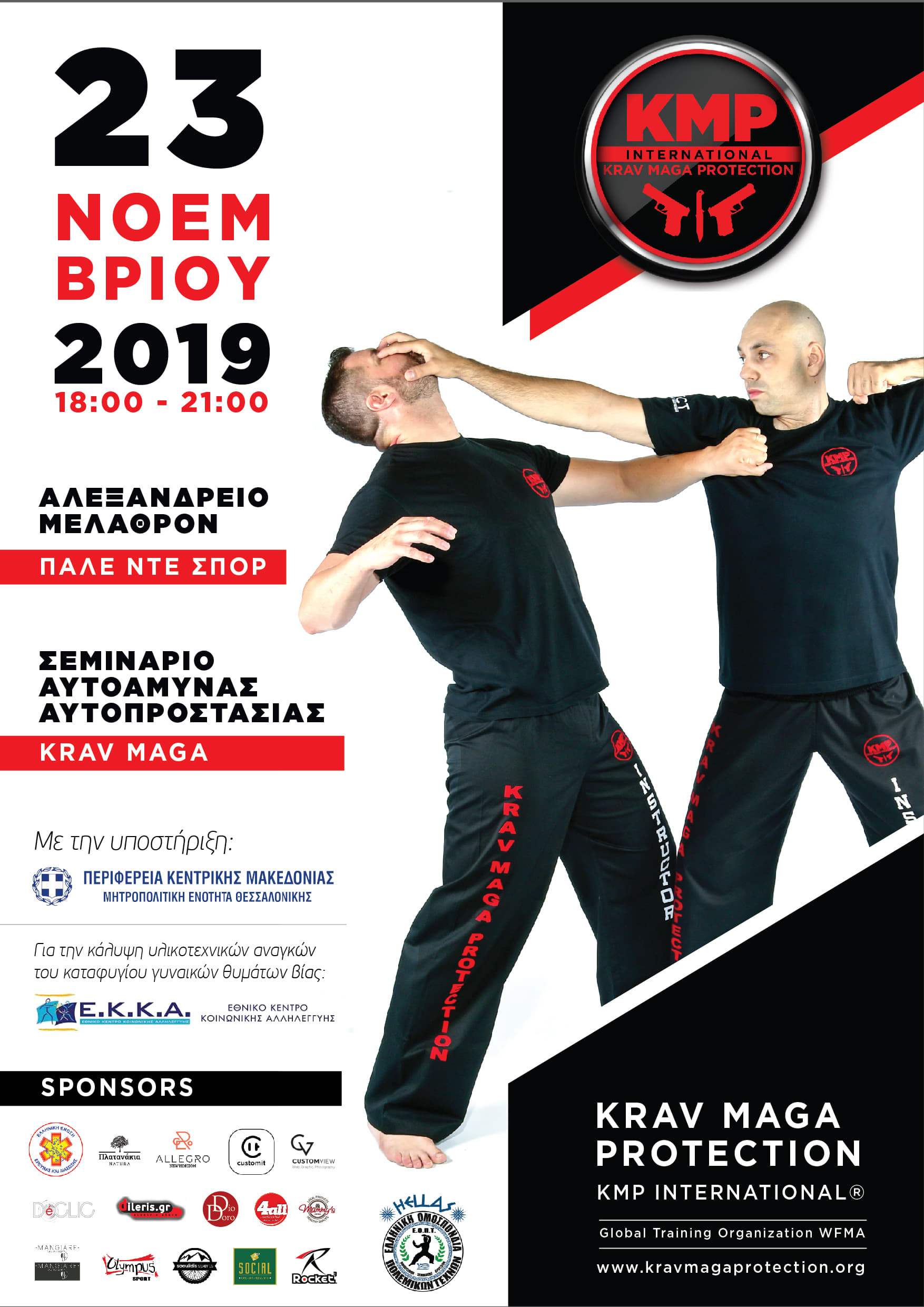
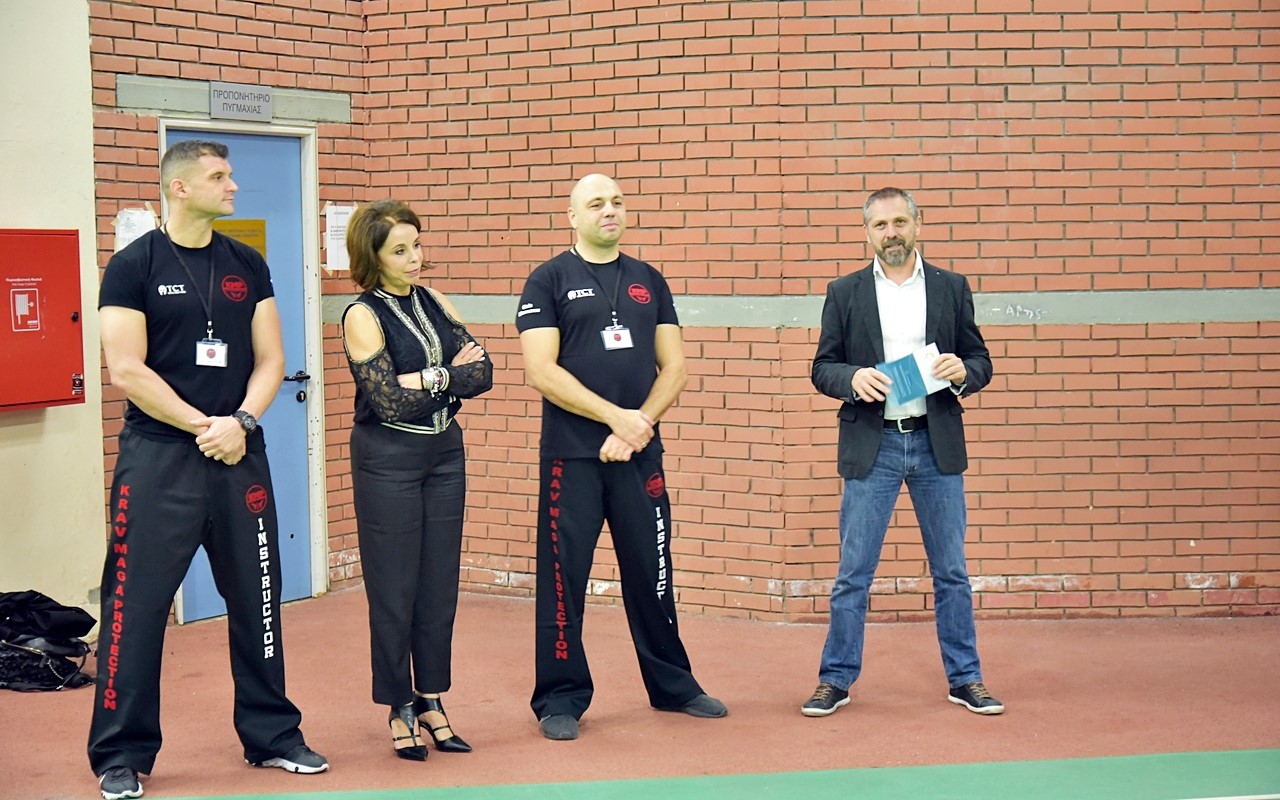
Καμπάνια Ευαισθητοποίησης-2018
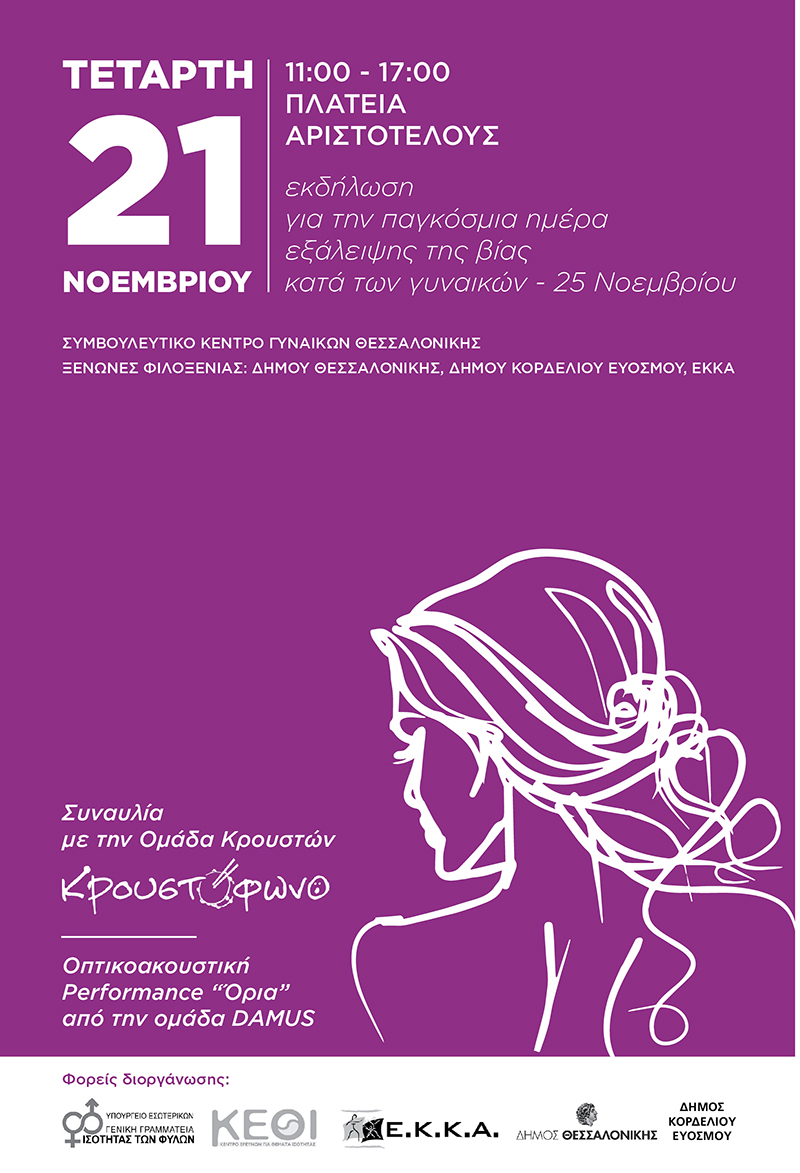
Καμπάνια Ευαισθητοποίησης-2017
Καμπάνια Ευαισθητοποίησης-2016



